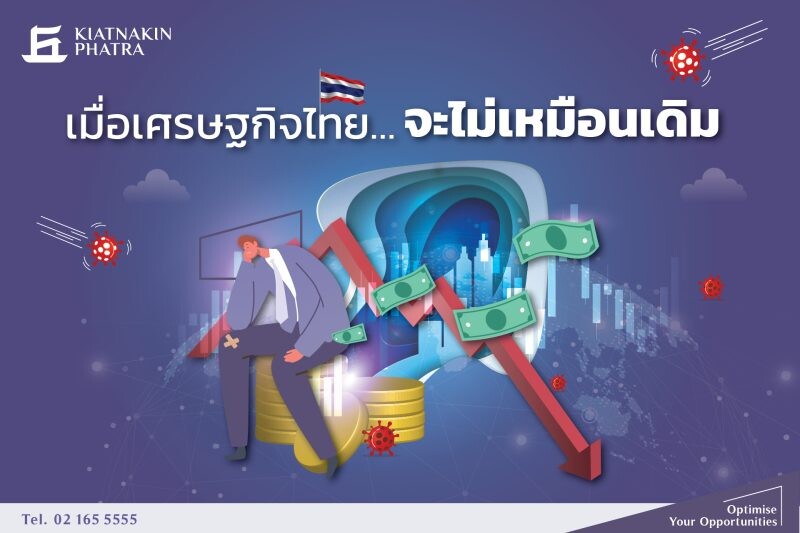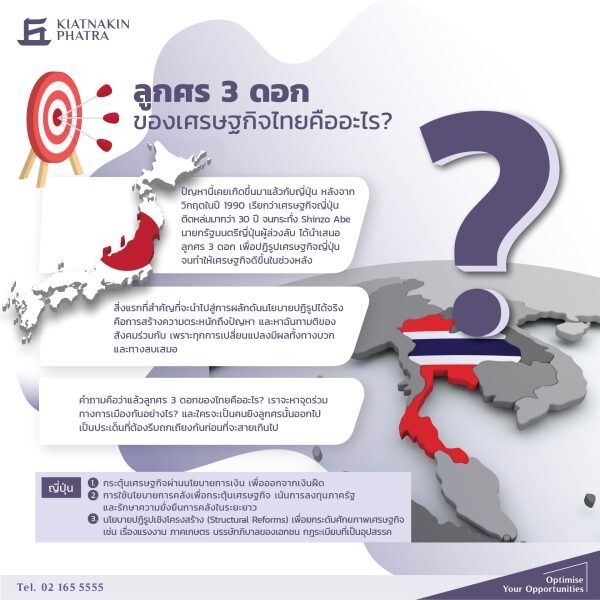KKP Identifies Four Trends in 2024 which Reflect a Turning Point for the Thai Economy, Emphasizing the Need for Consensus for Moving Forward
Dr. Pipat Luengnaruemitchai, Chief Economist, KKP Research, Kiatnakin Phatra Financial Group, stated that there are four trends that need to be closely monitored in 2024 global economy:

- Growth divergence: While the global economy as a whole is slightly slowing down, a notable divergence is evident, particularly in the top two economies. The US is expected to grow more robustly than initially anticipated, while China is facing a slowdown.
- After reaching their highest levels, global interest rates are now showing signs of decline: As global inflation slows down, central banks around the world are gradually cutting interest rates. However, due to the robustness of the US economy, the Federal Reserve may not be able to substantially lower interest rates.
- International politics remains uncertain and has considerable implications for the global economy, particularly with factors such as ongoing wars and elections occurring in various countries worldwide, including the United States.
- Thai economy's slow recovery, and end of rising interest rate cycle: The tourism sector's steady rebound and the recovery of exports are the main economic drivers this year. However, uncertainties regarding the government's economic stimulus policies could have a short-term effect. Thailand's interest rate policy is expected to remain at 2.5% for most of the year, with a possibility for a rate cut if the government fails to deliver on its stimulus plans, or if the growth projections are not met.
In addition to short-term concerns, Thailand's long-term economic prospect needs to be considered. Every time an economic crisis occurs, the Thai economy tends to recover with sluggish growth, especially after the COVID-19 crisis. Many anticipated that the Thai economy would return to normal growth after overcoming the COVID-19 crisis. However, after two years since the crisis, the Thai economy has yet to fully recover to its pre-crisis state. It is even recovering slower than expected.
The tourist sector, which was a vital engine before COVID-19, has not recovered to its pre-pandemic level due to the absence of Chinese tourists. While Thailand's exports previously relied on the global supply chain like China as the gateway to the world market, over the past 2-3 years, the country has struggled to expand its global supply chain. It has also increasingly lost competitiveness and its trade balance with China has deteriorated in recent years, notably in key products, such as electronics, electrical appliances, steel, and electric vehicles (EVs). At the same time, the country faces severe structural issues, including challenges posed by an aging society, a declining workforce, long-standing educational quality problems, and a lack of investment over nearly three decades since the 1997 Asian financial crisis.
"The Thai economy has now reached a turning point. What is more important may not be that we are unaware of the problems or how to solve them, but rather we need to reach a consensus within society on how to begin to address these issues. It is a matter that needs to be openly discussed because resolving these challenges will take time, possibly decades, to see results."
An illustrative case is Japan's economic reform during the time when Shinzo Abe served as Prime Minister from 2006 to 2007 and 2012 to 2020. He introduced the "Three Arrows" policy, targeting at monetary policy, fiscal consolidation, and economic reform, spanning various areas, including labor market, agriculture, corporate governance, regulations, competitiveness in the private sector, consumption tax increase, and Japan's participation in trade agreements. Nevertheless, it took nearly a decade before the Japanese economy began to recover. Throughout this period, Prime Minister Abe dissolved the parliament multiple times, allowing the public to create a "political consensus." This was essential as people experienced both benefits and drawbacks from the reform policies.

ติดต่อเราได้ที่ facebook.com/newswit